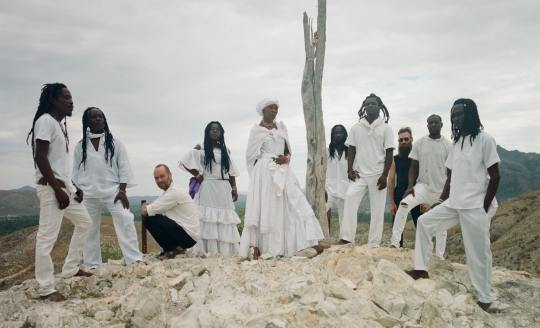|
Gonaives is an important Haitian city for many reasons; it’s the point where Haiti’s fight for independence began in the early 19th Century. It’s also long been the heart of the country’s Vodou practices- hurricanes, coups, and dictators notwithstanding. There are three temples, all continuing to practice different strands of vodou with links directly to Dahomey and the practice’s West African origins. This is a tradition, encompassing medicine, religion, music, and trance, that has been demonized cartoonishly by Hollywood and the West in general, as one more way to make black people seem either scary or primitive. Or both.
But as misunderstood as it still may be, vodou has also served as a source of identity, crucial in a country that, despite early independence, has been denied the ability to thrive by the US and the French for hundreds of years. And with Vodou, there has always been music, because Haitians have known forever that dance is the straightest path to ecstatic surrender. Start with the body in order to enter the mind. Chouk Bwa, whose hometown is Gonaives, understand this well. Since their 2012 inception, they’ve used drum and chant-based sounds to help people heal from hurricanes that have ravaged Haiti over the past 12 years, or to simply comment on vodou’s scarcity. As a result, they are aware of their own importance. Vodou Alé, recorded in Brussels in 2018 with Belgian electronic duo The Angstromers, applies dubby, hefty electronics to Chouk Bwa’s basic grooves, and the results are hypnotic.

|
|
The opening track, which gives the collection its title, traffics in a thick, rubbery mid-tempo rhythm before echo-drenched call and response vocals appear. This is the call for vodou, for people to join in and become part of this record’s 38-minute ceremony. The electronics cause the rhythms to seemingly change pitch between vocal segments, the entire track swathed in a layer of fog as leader Jean-Claude “Sambaton” Dorvil builds intensity. “Odjay- Nati Kongo” thrusts forward at an almost unbearable pace as Dorvil’s voice sails atop a furious stew of polyrhythms.

|
|
“Rårå,” a track referencing Haiti’s relentless horn-and-drum-driven festival music, starts off simply enough, with a galloping drum groove before being engulfed by electronic effects. This is the track where the Angstromers’ presence is at the forefront of the music, and it goes a long distance in showing why this collaborative hybrid works so well without compromising Chouk Bwa’s authenticity. What the entire album shows is the radical diversity of rhythms Haitian music is able to deploy as well as how centuries-old ritual music can intersect with modern electronics for sounds that together argue for vodou’s political, cultural, and historical relevance.
- Bruce Miller
|
